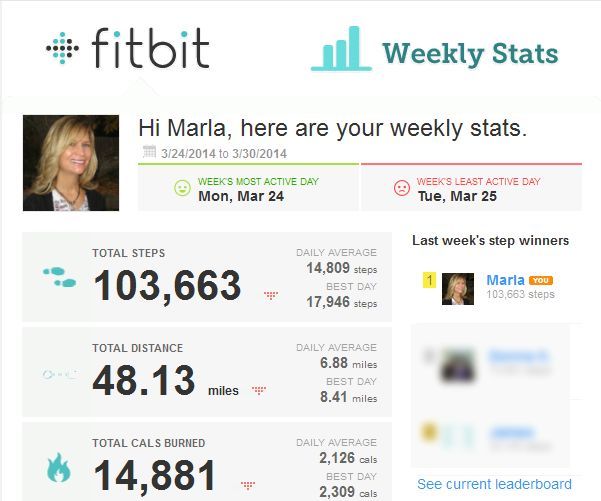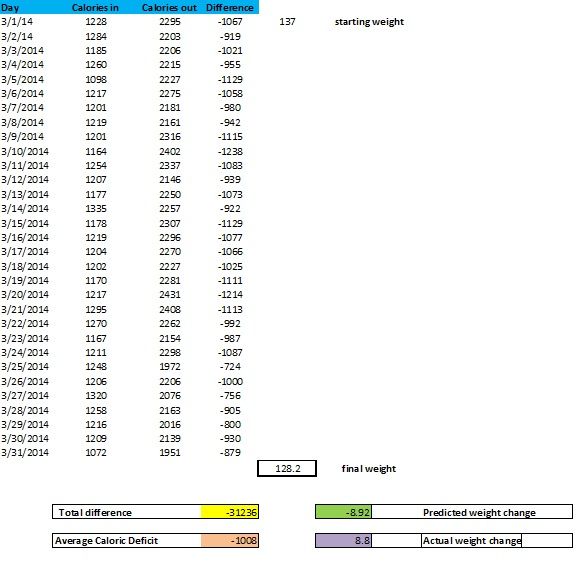 by Marla » Sat Apr 05, 2014 9:27 pm
by Marla » Sat Apr 05, 2014 9:27 pm
My top 10 reasons for not losing weight
One of the reasons I did this CRON-o-meter project was that I hoped I would be able to diagnose the factors that were keeping my weight higher than I wanted it. Unfortunately (?), I found that the activity of logging resulted in much better eating behavior! That meant I wasn’t able to “catch” myself doing many of the things that had been keeping me from losing.
What I was able to do though, was to reflect on what was different about my eating habits before and after I started the project.
Here, in no particular order, are some of the things I tend to do (or have done) that contribute to me not losing weight or actually gaining. I know, these are no-brainers, but I think I need a reminder so I am posting it here for my own future reference.
1. Unplanned, mindless, or “recreational” eating when not truly hungry. This is a big culprit, and it can sabotage me even when all the food is completely on plan. Granted, I don’t mindlessly eat celery. I’m talking about seeing half a cooked sweet potato on the cutting board and eating it; cutting the edges off of freshly baked oatmeal squares that I make for my family and eating them; nibbling on leftovers instead of putting them away; seeing something appealing in the cupboard and having some, even though I don’t need to eat; eating while cooking; snacking in front of the tv on popcorn, homemade potato chips or tortilla chips, banana ice cream, etc. Why do I do it? Well, the food tastes good and I want the pleasure of eating it. Many healthy foods can give you a little dopamine hit and a good feeling when you taste them. That’s all there is to it. I am vulnerable to this type of eating at any hour of the day, except when I have just finished a big meal. But an hour after that meal, as soon as I’m not “full,” I can nibble. I think the only way I can combat this problem is to make a rule for myself that I can’t eat between meals, period, unless I am genuinely hungry (which shouldn’t ever happen if my meals are large enough).
2. Keeping “food magnets” in the house. These are foods that may be on plan, but that I always overeat or eat for pleasure. I can’t resist them and will eat them until they’re gone. My food magnets include dry cereal, pretzels, crackers, nuts, dates/prunes/raisins, rice cakes or corn thins, "top chips" (microwave oil-free potato chips), and many more.
3. Not following the principles of calorie density. When I start to get off track, I eat fewer veggies at mealtimes, and the overall calorie density of my diet goes up. I also choose more meals made with flour products, creamy sauces, tofu, and other calorie dense ingredients.
4. Coffee. I have cut down my consumption to one mug per week since January 1 (plus an occasional “oops”), but before that I was drinking a mug of lightly sweetened decaf with soymilk every day. Once in a while I would also have one in the afternoon or even go to Starbucks for a “treat” of a flavored soy latte. This was not doing my weight any favors.
5. Wine. Alcohol is not good for me, I know that. But like many people, I enjoy it. The problem with wine for me is that it very quickly turns from a “special occasion” indulgence, to an every weekend habit, to an every night habit. My DH drinks it often (although he has cut down recently), which makes it harder for me to say no. In addition to being a poison and a carcinogen, it has a lot of calories. I need to stay away from it.
6. Healthy desserts and baked goods. These are too irresistible to me, and they are calorie dense as well. This includes quickbreads, muffins, oat bars, homemade artisan bread or rolls, McDougall-friendly cinnamon rolls, brownies, Larabars, rice pudding, chocolate tofu pudding, sorbet….basically, any on-plan sweets. It is sad that I can’t have them, but I am not easily able to control how much of them I eat.
7. Restaurants. Once I give myself permission to eat some restaurant food that is “almost” on plan, such as Chipotle, Subway, cheeseless veggie pizza, or certain Vietnamese restaurant dishes (which are “not very” oily), I get into trouble. For one thing, I shouldn’t be eating this food at all. For another thing, I always underestimate how frequently I am doing it (i.e. in my mind it is less than once a month, but in reality it may be twice or even three times in a month).
8. Off-plan food. This is an infrequent thing for me, but as with restaurant food, it is easy to underestimate how often I indulge in it because I conveniently forget, especially if it was “just a little bit.” I am talking about eating some chips and salsa at a party, a bite of this or that at a potluck, a handful of processed snack food that someone else brought into the house. Even if it is not a common occurrence, it adds up.
9. Candy. I am putting this in its own category, because I have a special problem with it. Years ago, when I first read all of Dr. McDougall’s books and articles, I came away with the impression that sugar was – how should I phrase this – the least of all possible evils. In the Quick and Easy Cookbook he says “sugar has very little to do with fat gain,” and he says it is not the cause of obesity or diabetes. I didn’t notice him discussing any damaging health effects (apart from high triglycerides in sensitive people, which I have never had). He allowed sugar in recipes, and praised the Rice Diet which included rather large amounts of it. So, I convinced myself that if I was going to cheat, it was not that bad to cheat with fat-free, dairy-free candies like jelly bellies, licorice, hot tamales, ginger chews, hard candy, Charms lollipops, fruit pectin jellies, etc. After all, they didn’t contain any fat or animal products – just sugar. When I learned, quite recently, that sugar can be damaging to your endothelium, that helped a LOT with my motivation to avoid these. But, I am still tempted sometimes, especially when I have already gotten off track in other ways. Off-track eating seems to snowball for me once I go down that path. I am proud to say that I haven’t had one single taste of candy since January 1. I think complete abstinence is the only way for me to deal with my candy addiction. I should add that I suspect it does, in fact, contribute to weight gain for me, but I admit that I have never tested this by adding sugar/candy to an otherwise perfect diet to see what happens. Whenever I have been in candy-eating mode, I’ve also typically been eating too much fat and other processed food as well, so I can’t say for sure that sugar by itself causes me to gain weight.
10. My last item is not related to diet – it’s about exercise. Every time I’ve regained weight, I haven’t been exercising. In fact, there seems to be an inverse correlation between calories and exercise in my life: when I exercise, I eat fewer calories. You’d think it would be just the opposite, that more exercise would trigger my brain to make me eat more calories to fuel my increased activity, but it doesn’t work like that. Exercise seems to blunt my appetite and make me less hungry. In addition, there is a psychological effect that makes me want to eat better if I have exercised that day (I guess I don’t want to negate the benefits of the exercise by eating junk). All I know is that getting off track with my food is generally accompanied by slacking off with my exercise also. This is a terrible combination! As I have mentioned a couple times in this journal, during the holidays I was only burning about 1500 calories a day, because I was not doing any intentional exercise most days. Yet that was a time period when I was probably eating 2500 calories a day or more, depending on how much I was engaging in behaviors 1 through 9 above. If I’d increased my calories OR decreased my exercise, I wouldn’t have gained as much, but I did both. Note to self: if I am too busy to exercise for a while, then I need to pay even more attention to eating the right foods and not overeating. If I find my diet slipping a little, that is not the time to start skipping workouts. Duh!
I think that each of us who struggles with weight maintenance probably has his or her own personal list of behaviors that contribute to the problem. These are mine. I hope that by calling myself out on them, here and now, I'll be more likely to recognize these trends if they begin to surface again.








 They are amazing! Going to give them a go in the garden this year (if I can get shoots quick enough, that is.) Have you found a reasonably definitive source for their nutrition facts? Your calories/gram seems higher than what I am seeing in articles on the web. Wasn't sure if you found a reliable source or were using regular sweet potato info. Thanks!
They are amazing! Going to give them a go in the garden this year (if I can get shoots quick enough, that is.) Have you found a reasonably definitive source for their nutrition facts? Your calories/gram seems higher than what I am seeing in articles on the web. Wasn't sure if you found a reliable source or were using regular sweet potato info. Thanks!